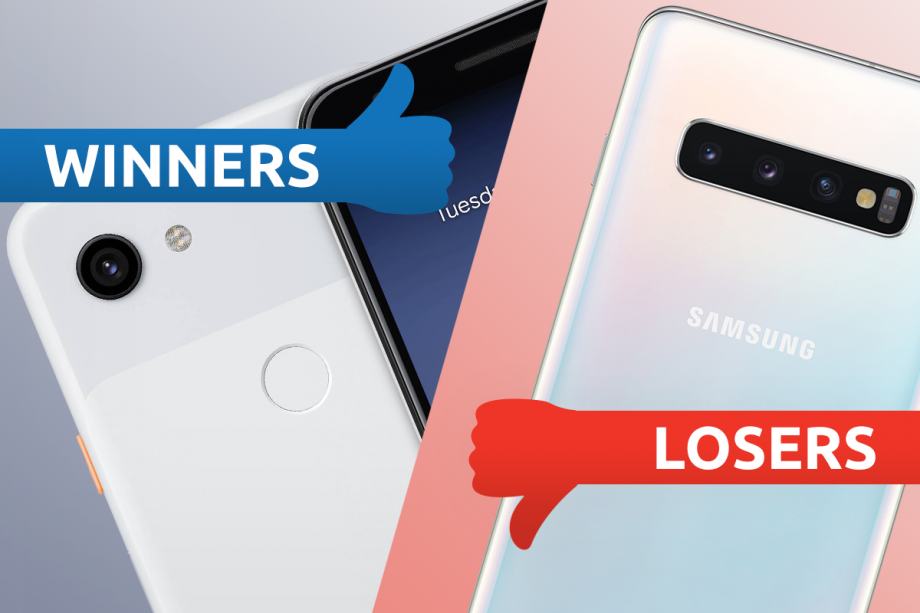Winners & Losers: Every phone maker, except Google, is struggling to shift units

It’s been a fairly bad week (or two) for anyone invested in a major smartphone manufacturer, as it seems that pretty much every big name out there is struggling to sell new phones – with the exception of Google, whose Pixel 3a is selling quite nicely, thank you very much.
That’s not to say that there haven’t been other ups and downs this week – TV and telecoms regulator Ofcom has given the BBC the go-ahead to extend the catch-up window of iPlayer from 30 days to a year, so it can better compete with the likes of Netflix, Amazon Prime, and Now TV.
Speaking of advert-free streamed media, YouTube Premium has finally launched Full HD downloads, too, and, in what will literally be music to the ears of the carbon footprint-conscious, House of Marley has released some new earbuds which are made of sustainable materials.
On the bad side of things, anyone who rushed out to pepper their kitchen surfaces with Amazon Dash buttons is going to end up feeling even sillier now, cos Amazon won’t be supporting them after this month, MVNO GiffGaff goofed by double-billing its customers, earning itself a £1.4m wrist slap from Ofcom, and people of the ‘muh PC Master Race’ persuasion will likely be peeved to learn that console noobs will get to slay on Monster Hunter Iceborne before they will.
But compared to the woes of phone makers across the globe, this is all relatively small beer…
Winner: Google, for selling shedloads of Pixel 3a’s
Even though this is technically news from last week, against the backdrop of doom and gloom from other mobile makers, news of Google’s success with the Pixel 3a and Pixel 3a XL, which have seen phone sales doubling year-on-year, bears repeating.
It turns out that you can make an amazing phone that people will want to buy, and not have to charge them over a grand for the privilege, and it’s our hope that the gains made by Pixel 3a can show others the way.
Of course, Google benefits from being Google, the company that designs and develops the operating system used by the great majority of the industry. CEO Sundar Pichai admitted in a call to investors last week that by building the new Pixel phones from the ground up it was able to make a saving – which it’s wisely passed on to consumers.
“By taking advantage of our leading software capabilities, we can offer users a premium phone experience at a much lower price point. With the launch of Pixel 3a in May, overall Pixel unit sales in Q2 grew more than 2x year over year.”
Google can also afford to sell devices at a loss, too – revenue for parent company Alphabet in Q2 was $38.9bn (~£32.06bn), a year-on-year increase of 19%.
By contrast, Samsung, which does not benefit from dominating the Internet ad sales landscape, endured a 56% year-on-year drop, this week posting profit of 6.6tn Korean won (~£4.6bn), down from 14.87tn Korean won (~£10.3bn) the same time last year.
Losers: Pretty much every other phone maker
Samsung’s hoping that sales of its mid-range phones can pick up the slack this year, after admitting that sales of its excellent flagship Galaxy S10 phones have, er, flagged. Falling iPhone sales ended up hurting Apple twice – flogging fewer phones not only directly hurt Apple’s revenue stream, but as a result of that, Cupertino didn’t buy up as many OLED panels from its supplier (which happens to be none other than… Samsung).
Huawei continues to suffer, too. As direct result of the U.S. vs China trade beef, Kantar World Panel’s Dominic Sunnebo suggested that Huawei owners are putting off upgrading to newer phones like the P30 Pro – though it looks like a new-look Huawei Mate X foldable may be hitting shelves soon.
Even fitness trackers aren’t immune, with the Fitbit Versa Lite, a stripped-down budget fitness band, not doing the numbers that its maker clearly hoped for.
A lot of this glut could be down to phones these days generally offering better longevity, especially in terms of battery performance than before, and generally all being excellent in terms of display quality.
Phones these days are also very similar in terms of what they do – they all let you access the Internet at high speeds, take fantastic photos, and all let you trade insults with the loud and the ill-informed on social media.
So, maybe we don’t need a new phone, as much as we’d like one, and maybe buyers are tighten belts, conscious of the environmental impact of their consumer choices, mindful of a possible no-deal Brexit (and the financial uncertainty that represents) in October, or… perhaps, their old phone from a couple of years back is just fine and doesn’t need upgrading?


